Human capital of student youth as a subject of personnel marketing
The relevance of the stated research problem is determined by the special role of student youth as the main engine in building up and updating the country's human capital, thereby forming the foundation of its long-term stability and modernization potential. nflated expectations (primarily regarding salary) when entering the labour market can lead to unsuccessful job searches. This can reduce students' human capital by casting doubt on their capabilities, qualifications, and even the suitability of their chosen profession. Correctly structured personnel marketing helps to adjust students' expectations, providing them with a clear understanding of career prospects, thereby preserving and increasing their human capital. The scientific problem lies in the contradiction between the need to develop and implement the human capital of student youth in the modern labor market and the lack of practice in applying HR marketing mechanisms that allow for targeted attraction, development and retention of young personnel. The formulation and prospects for solving the problem are associated with the need to analyse the experience of implementing human capital among student youth empirically, and to determine the key points of applying personnel marketing tools to this process. For conceptualization, the work used general and specific methods of scientific research (analysis, synthesis, analogy, comparison, specification, the method of formal-logical analysis, graphic, structural-functional methods), as well as a set of sociological research methods (questionnaire survey, semi-structured in-depth interview). Research Results. Understanding the specifics of the processes of implementing the human capital of student youth allows us to conclude that it is necessary to consider it as a separate category, which is due to the presence of a number of features in comparison with other age groups. The use of sociological methods made it possible to supplement the analysis and substantiate the main tools of personnel marketing aimed at both attracting and retaining and increasing the involvement of young people in the activities of the employer. Conclusions. In total, the human capital of young people is distinguished by a combination of high learning ability, digital and innovative competencies with a deficit of experience, resources and stable social connections. This makes the younger generation both the main driver of transformations and the most sensitive group to structural imbalances in the labor market. HR marketing can act as a link (“bridge”) between the potential human capital of student youth and its practical implementation in the economy. Its competent application accelerates the transformation of knowledge and skills into productive work, strengthening the competitiveness of companies and the national economy as a whole.
Figures
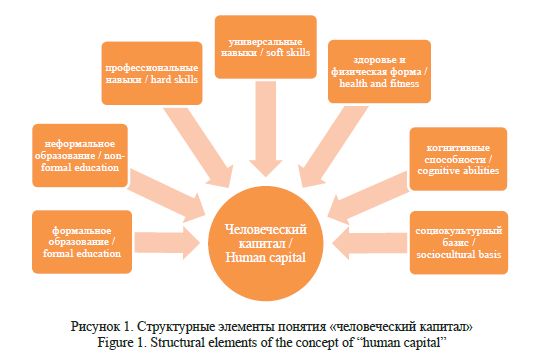
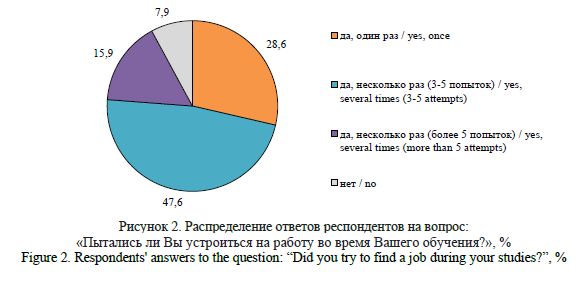
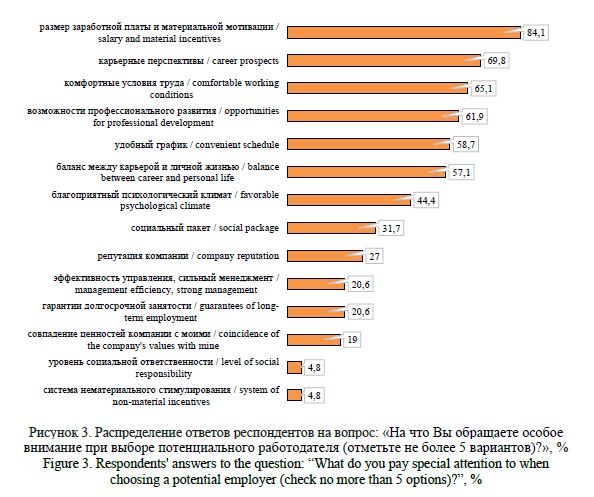
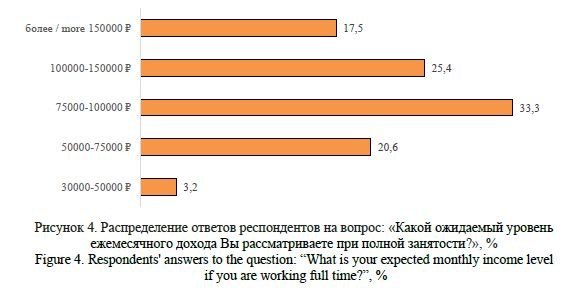
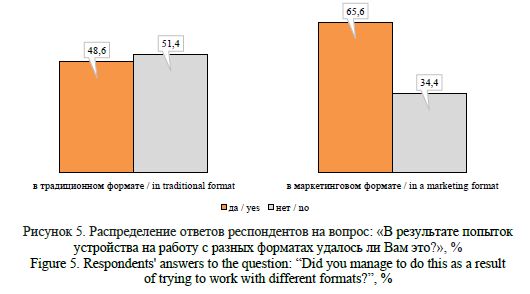
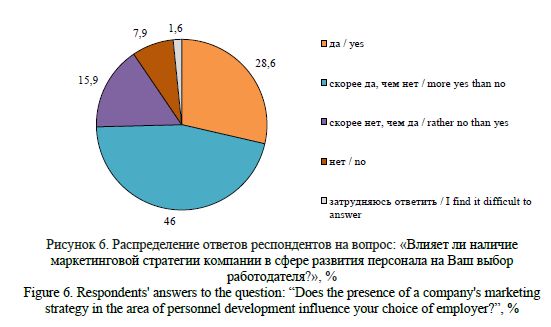
Gaidukova, G. N. (2025), “Human capital of student youth as a subject of personnel marketing”, Research Result. Sociology and management, 11 (3), 243-262. DOI: 10.18413/2408-9338-2025-11-3-1-4.


















While nobody left any comments to this publication.
You can be first.
Alekseenok, А. А., Tian, Xiaoyu and Nalivayko, K. V. (2025), “A sociological analysis of the traditional values of modern students (based on the materials of Qingdao)”, Research Result. Sociology and Management, 11 (1), 5-22, DOI: 10.18413/2408-9338-2025-11-1-0-1, EDN: EBQNNT. (In Russian)
Bekker, G. (2003), Chelovecheskoe povedenie: ekonomichesky podkhod. Izbrannye trudy po ekonomicheskoy teorii [Human Behavior: An Economic Approach. Selected Works on Economic Theory], GUVShJe, Moscow, Russia. (In Russian)
Boronina, L. N. and Balyasov, A. A. (2020), “Comparative analysis of models of innovative potential of students and working youth in industrial regions of Russia”, Sotsiodinamika, (12), 96-108, DOI: 10.25136/2409-7144.2020.12.34594, EDN: UZVBXF. (In Russian)
Bocharov, V. Yu. and Gavrilyuk, V. V. (2024), “Professional, Career and Status Expectations of a Non-capital University's Students”, Uroven zhizni naseleniya regionov Rossii [Living Standards of the Population in the Regions of Russia], 20 (3), 437-449, DOI: 10.52180/1999-9836_2024_20_3_9_437_449, EDN: GPXVSF. (In Russian)
Burdie, P. (2001), Prakticheskiy smysl [Practical meaning], Aleteya, St.-Petersburg, Russia. (In Russian)
Demyanchenko, N. V. (2018), “Development of a holistic paradigm of personnel marketing in the corporate strategy of the organization”, D. Sc. Thesis, Krasnodar, Russia. (In Russian)
Zavyalova, E. K. and Bordunos, A. K. (2024), “Strategic approach to assessing the digitalization of human resource management systems: an example of Russian companies”, Sotsialnaya psikhologiya i obshhestvo, 15 (2), 164-178, DOI: 10.17759/sps.2024150211, EDN: HDUNBH. (In Russian)
Zinich, A. V., Evdohina, O. S. and Kondratieva, O. V. (2018), “Resource base for the adaptation of young people in the labor market within the framework of the concept of human capital formation”, Fundamentalnye issledovaniya, (12-1), 106-112. (In Russian)
Zolotina, O. A. and Serpukhova, M. A. (2023), “Economics and Management Graduates: Employment Profiles and Generational Features”, Uroven zhizni naseleniya regionov Rossii [Living Standards of the Population in the Regions of Russia], 19 (2), 181-198, DOI: 10.52180/1999-9836_2023_19_2_3_181_198, EDN: FKPACL. (In Russian)
Zubok, Y. A. (2022), “Changing social reality: a reflection on theoretical and empirical aspects of sociological research on youth”, Research Result. Sociology and management, 8 (3), 10-30, DOI: 10.18413/2408-9338-2022-8-3-0-2, EDN: CUCVFI. (In Russian)
Ivanova, I. A. (2020), “Non-material motivation and incentives: from conceptual approaches to practical application in the context of digitalization of the organizational environment”, Upravlenie personalom i intellektualnymi resursami v Rossii, 9 (2), 19-25, DOI: 10.12737/2305-7807-2020-19-25, EDN: VFJVSF. (In Russian)
Kamyshina, E. A. (2022), “The relationship between youth socialization and the quality of human capital”, Sovremennoe obrazovanie: soderzhanie, tehnologii, kachestvo, (1), 439-440. (In Russian)
Karpova, S. V. (2022), “Modern approaches to the formation of a system of motivation of young people to improve the quality of life as a factor in the creation of human capital”, Ekonomika. Nalogi. Pravo [Economics, taxes & law], 15 (6), 55-65, DOI: 10.26794/1999-849X-2022-15-6-55-65, EDN: FXYZPK. (In Russian)
Kisilenko, A.V. and Shapovalova, I. S. (2023), “Designing a life path or how do young people see their future?”, Sociological Research, (2), 83-94, DOI: 10.31857/S013216250024385-6, EDN: ODCAGO. (In Russian)
Martynova, O. Ju. (2023), “Features of the application of marketing in the selection of personnel in a social network”, Chelovek. Sotsium. Obshhestvo, (12), 260-262. (In Russian)
Nazarova, U. A. and Gracheva, N. A. (2014), “Regional personnel marketing: problems of post-educational migration”, Fundamentalnye issledovaniya, (11-5), 1124-1128. (In Russian)
Odintsov, E. (2024), “Almost half of Russian students work in parallel with their studies”, Rossijskaya gazeta, [Online], available at: https://www.gazeta.ru/social/news/2024/04/24/22860206.shtml (Accessed 18 July 2025). (In Russian)
Pavlenko, O. V. (2015), “Non-material motivation in the personnel management system”, Ekonomika i predprinimatelstvo, 3-2 (56), 524-527. (In Russian)
Pavlova, E. Ju. and Sergeeva N. V. (2020), “Problems and prospects of using social networks in the work of the company's HR department”, Vestnik Altaiskoy akademii ekonomiki i prava, (2), 70-76, DOI: 10.17513/vaael.1001, EDN: CVENES. (In Russian)
Rybakova, M. V. (2019), “Managing the development of human capital of student youth”, Sotsialno-gumanitarnye znaniya, (6), 129-135. (In Russian)
Semina, A. P. (2020), “Recruitment through social networks: HR marketing”, Aktualnye problemy ekonomicheskogo razvitiya [Current issues of economic development], Belgorod, Russia, 334-339. (In Russian)
Sorokin, O. V. (2020), “Meaningful deviations in the youth environment: the experience of sociological research”, Znanie. Understanding. Skill, (4), 116-128, DOI: 10.17805/zpu.2020.4.10, EDN: HSDGKE. (In Russian)
Sorokin, O. V. (2022), “Meanings deviations of Russian youth at work”, Research Result. Sociology and management, 8 (3), 79-90, DOI: 10.18413/2408-9338-2022-8-3-0-6, EDN: PBEYDS. (In Russian)
Tarasova, E. M. (2020), “Career Self-Determination of Undergraduate Students”, Yaroslavskiy pedagogichesky vestnik [Yaroslavl Pedagogical Bulletin], 5 (116), 148-154, DOI: 10.20323/1813-145X-2020-5-116-148-154, EDN: ZMVTFS. (In Russian)
Titarenko, L. G. (2019), “Development of the modernization potential of student youth as a prerequisite for successful inclusion in the digital reality”, SOTIS – sotsialnye tekhnologii, issledovaniya, (2), 25-32. (In Russian)
Ushenkov, E. E. (2020), “Assessment of the level of innovative potential of young people (based on research in the Ivanovo region)”, Vestnik Nizhegorodskogo universiteta im. N.I. Lobachevskogo. Seriya: Sotsialnye nauki, (2), 127-133. (In Russian)
Fetyukov, A. V. and Leonidova, G. V. (2024), “Willingness to Work by Profession (Based on Survey of Teacher Education Graduates)”, Sotsialnoe prostranstvo [Social Area], 10 (1) [Online], available at: http://www.socialarea-journal.ru/article/299124 (Accessed 18 July 2025). (In Russian)
Khashaeva, S. V. (2023), “Career strategies of young people as a reflection of ambitions and competitive practices in professional activities”, Research Result. Sociology and management, 9 (4), 47-57, DOI: 10.18413/2408-9338-2023-9-4-0-4, EDN: PXAEKJ. (In Russian)
Shapovalova, I. S. (2024), “Potential of youth in regional human capital”, Proceedings of the Central Russian International Academic Forum Images and models of the future, Orel, Russia, 245-251. (In Russian)
Shestakova, N. N., Skvortsova, M. B. and Kuzmina L. K. (2019), “On the human capital of young people who are NEET”, Ekonomika truda, 6 (1), 565-586, DOI: 10.18334/et.6.1.40077, EDN: SVNFNJ. (In Russian)
Yusupova, A. S (2025), “Human capital management in a culturally diverse environment: youth values and identity as a factor of organizational development”, Ekonomika i upravlenie: problemy, resheniya, 3 (9), 122-131, DOI: 10.36871/ek.up.p.r.2025.03.09.017, EDN: VHKCNC. (In Russian)
Andersson, А. В. (2021), “Social capital and self-efficacy in the process of youth entry into the labour market: Evidence from a longitudinal study in Sweden”, Research in Social Stratification and Mobility, 71, 100580, DOI: 10.1016/j.rssm.2020.100580, EDN: UPNANE.
Banerjee, S., Bhattacharyya, S. and Bose, I (2023), “The motivation paradox: Understanding contradictory effects of awards on contribution quantity versus quality in virtual community”, Information & Management, 60(7), 103855, DOI: 10.1016/j.im.2023.103855, EDN: JFKKSY.
Boat, А. A., Syvertsen. А. К., and Scales, Р. С. (2021), “The role of social capital in promoting work readiness among opportunity youth”, Children and Youth Services Review, 131, 106270, DOI: 10.1016/j.childyouth.2021.106270, EDN: IMEKIQ.
Cui, X., Yang, X., Ren, J., Lowry, P.B., and Du, N. Ch. (2025), “Enhancing team creativity among information technology professionals
through knowledge sharing and motivational rewards: A self-determination perspective”, Data and Information Management, 9 (2), 100075.
Howe, N. and Strauss, W. (2007), Millennials Go to College: Strategies for a New Generation on Campus: Recruiting and Admissions, Campus Life, and the Classroom, LifeCourse Associates, Great Falls, Va.
Schultz, T. W. (1963), The Economic Value of Education, Colambia University Press, New York.